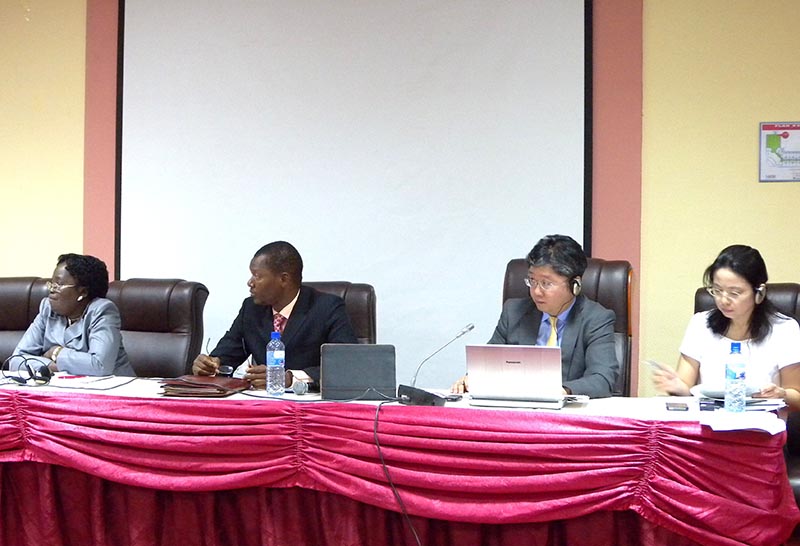Participatory School-based Management for Quality Education: A Joint Seminar by JICA and Burkina Faso's Ministry of Education
2015.03.11
On February 10, 2015, Ministry of Education of Burkina Faso (MENA) and JICA hosted “Joint-seminar for participatory school-based management for improving quality: findings and policy implications from three studies.”
JICA-RI has been implementing two research projects on education in Burkina Faso. One is “Impact Evaluation Analyses for the JICA Project” aiming to review and clarify the impacts of JICA projects by applying econometric analysis to empirical data. As part of this project, JICA has been analyzing the impact of the “School for All” project in Burkina Faso, which promotes participatory school-based management (SBM). The other involves the use of the comprehensive program called SABER (System Approach for Better Education Results) introduced by the World Bank, which collects and analyzes policy data on education systems around the world, using evidence-based frameworks. By utilizing SABER, this research project aims at providing policy recommendations by analyzing the effectiveness of participatory SBM and identifying the gap between policy and its implementation.
This seminar was held to share the findings obtained through two projects with a wide range of stakeholders, and to discuss the policy implication of these findings. The event brought together around 60 practitioners and researchers including representatives of MENA, JICA experts, and delegates from UNICEF and other international organizations, NGOs and universities.
Hiromichi Morishita, JICA Resident Representative in Burkina Faso, and Ibrahim Sanon, Director-general of General Office for Research in Education and Training Reform at MENA gave opening remarks, explaining the history and background of the “School for All” project in Burkina Faso.
Subsequently, three presentations were given on the findings of the research projects. Firstly, Yasuyuki Sawada, Professor at the Faculty of Economics, the University of Tokyo (JICA-RI Visiting Fellow) presented the result of econometric analysis on the impact of “School for All” project. In this analysis, he explained that Randomized Controlled Trial (RCT) method was adopted in selecting the schools to establish School Management Committees (SMC) so that multi-effects of the project are analyzed quantitatively without any bias. Analysis shows the decreases of repetition rate and teacher absence, the enhancement of social capital, and promotion of community’s participation in micro finance. Participants pointed out the need to expand the scope of the survey to other regions within the country and neighboring countries in order to improve the robustness of the analysis results, and the importance of cost-benefit analysis that quantitatively compares the project’s outcomes with its implementation costs.

(From right)Project Leader, TakakoYuki
and Professor Yasuyuki Sawada
Secondly, Takako Yuki, who is responsible for JICA-RI SABER project, gave a presentation on the results of policy evaluation on school management in Burkina Faso. The policy decision by the Burkina Faso government to introduce SMCs nationwide, based on a pilot of the “School for All” model, has been contributing to improve the quality of education. However, it was also revealed that a disparity in each school in terms of policy implementation and the function of SMCs affects the completion rate and result of national achievement exams. Yuki underlined the need of further improvements in the implementation of policy on the ground. Finally, Fatimata Konfe from MENA and Professor Damien Lankonde of CEDRES, University of Ouagadougou gave a presentation on the results of a baseline survey for the second phase of “School for All” project, which began in 2014. They explained that strengthening partnerships with local government would further improve the function of SMCs.
These research outcomes revealed that the establishment of SMCs and improvements in their function lead to improved quality of education. In order to maximize the function of SMCs in improving the quality of education, it was suggested that the activities of SMCs reflects the outcomes of learning assessment such as graduation examinations, and that the regional network of SMC Councils should be encouraged. Participants exchanged opinions regarding the necessary policies and measures to promote SMCs more effectively and sustainably nationwide.
The research members of “Impact Evaluation Analyses for the JICA Projects” organized a technical session on the impact analysis research for the “School for All,” focusing on econometric methods and data. Local researchers such as professors attended this session where Professor Sawada, as well as Yasuyuki Todo, Professor of Graduate School of Economics at Waseda University (JICA-RI Visiting Fellow) and Haruko Noguchi, Professor of Faculty of Political Science and Economics at Waseda University gave presentations.
The results of this seminar were reported in local newspapers and other media (in French).

事業事前評価表(地球規模課題対応国際科学技術協力(SATREPS)).国際協力機構 地球環境部 . 防災第一チーム. 1.案件名.国 名: フィリピン共和国.

事業事前評価表(地球規模課題対応国際科学技術協力(SATREPS)).国際協力機構 地球環境部 . 防災第一チーム. 1.案件名.国 名: フィリピン共和国.

事業事前評価表(地球規模課題対応国際科学技術協力(SATREPS)).国際協力機構 地球環境部 . 防災第一チーム. 1.案件名.国 名: フィリピン共和国.

事業事前評価表(地球規模課題対応国際科学技術協力(SATREPS)).国際協力機構 地球環境部 . 防災第一チーム. 1.案件名.国 名: フィリピン共和国.

事業事前評価表(地球規模課題対応国際科学技術協力(SATREPS)).国際協力機構 地球環境部 . 防災第一チーム. 1.案件名.国 名: フィリピン共和国.
scroll